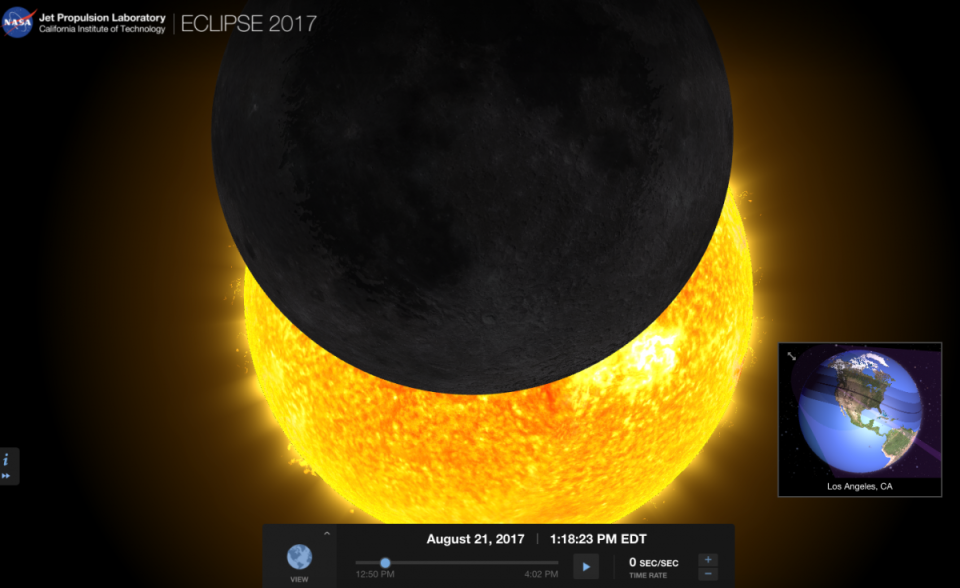This story is free to read because readers choose to support LAist. If you find value in independent local reporting, make a donation to power our newsroom today.
This archival content was originally written for and published on KPCC.org. Keep in mind that links and images may no longer work — and references may be outdated.
When and how to see the solar eclipse in Los Angeles (without blinding yourself)
On Monday, Aug. 21, the moon will cross between the Earth and the sun, casting a shadow onto the planet that turns day into twilight across the United States. It'll be the first total solar eclipse visible to people in the contiguous U.S. since 1979. Here in Southern California, we'll only see a partial eclipse, but more than half of the sun will be covered — which means that we'll see some eerie mood lighting.
Folks further north in Oregon will experience a total solar eclipse at 10:21 a.m. – the same time the partial eclipse here will be at its maximum. The total eclipse will then track southeast across the U.S., following a path of totality 70 miles wide that will pass through Idaho, Wyoming, Nebraska, Missouri, Kentucky, Tennessee and South Carolina.
Over the past 500 years, the same path of totality has been followed only 15 times.
What you'll see in L.A.
If you're in L.A., you're about 670 miles from totality — meaning you won't see one of those iconic eclipse images of the moon's shadow surrounded by the sun's dancing corona.
But lucky you, about 70 percent of the sun will be covered by the moon, and you'll be able to see that from anywhere you can see the sun. (But never look at the sun or a partial eclipse with the naked eye. More on that below.) Here's how much eclipse we're getting in Los Angeles:

At 9:05 a.m., the moon will start its transit across the disc of the sun, peaking at 10:21. Everything will return to normal by 11:44. During the transit, the temperature will drop, and it's estimated that utility companies will need to add an extra 6,000 megawatts to make up for the decrease in solar energy.
You won't see a total solar eclipse in L.A. in your lifetime
Total solar eclipses occur somewhere on Earth every 18 months or so, but only 0.5 percent of the earth is covered during the events — and since 70 percent of the Earth is covered in water, they're not always easily visible.
2024 will be the next time a total solar eclipse will be visible in the U.S., but the path of totality will run through the center and eastern parts of the country. If you're waiting to watch one from your backyard in L.A., it's going to be at least another 1,000 years.
To predict future eclipses, scientists have to do a number of calculations. They've got to determine when there's going to be a new moon and when the Earth, moon and sun will line up perfectly, at exactly the right time.
Since the sun is 400 times the size of the moon, but 400 times as far from Earth, they appear to be the same size in our sky. If they don't line up perfectly, we don't get a total solar eclipse. It's believed that Claudius Ptolemy figured out how to make some of those predictions around 140 A.D.
There are few constants in the universe, and since the moon is creeping away from the Earth at a rate of 1.5 inches per year, at some point it'll be too far away to cause any total solar eclipse.
Viewing the eclipse without eye protection can be dangerous
If you view the sun without eye protection, you run the risk of damaging your retinas. Even if the sun is 99 percent obscured, a small sliver of light peaking out from behind the moon is enough to flood them with ultraviolet radiation, causing permanent damage. Burning your retinas by viewing the sun is called "solar retinopathy," and it can include blurred vision and vision loss.
To view the eclipse safely, you can use a pinhole camera or wear specially-made eclipse glasses.
The American Astronomical Society has a list of approved vendors that you can buy eclipse glasses from.
There are eclipse watching parties going on around L.A.
It's likely too late to find a place to stay that's in the path of totality. People have been booking their accommodations for over a year, but that doesn't mean you can't have some fun in Southern California.
- The Mount Wilson Observatory will host an event, complete with telescopes available to the public.
- The Griffith Observatory will also be staffed by professionals who will have telescopes open to the public.
- Caltech is hosting their own solar eclipse festival the weekend prior to the big day, and they'll host experts from JPL on the day itself.
- The Kidspace Children's Museum will hold a kid-oriented event.
- There are also events at L.A. public libraries across the city.
- UC Riverside's Physics and Astronomy Department will hold an event open to the public, on campus.
Disclosure: Reporter Jacob Margolis's father produces eclipse glasses, but Jacob doesn't have any direct financial ties to the business.










